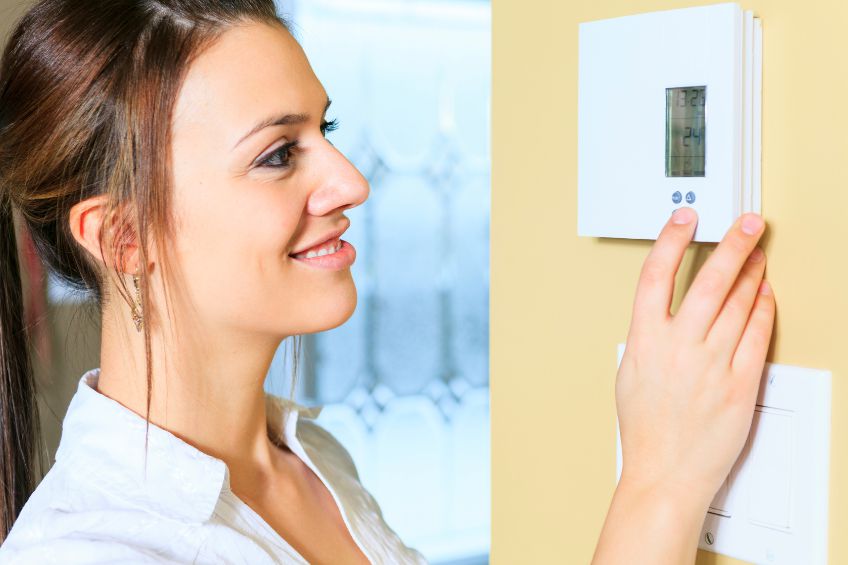Seniors are often quite sensitive to temperature changes, with their aging bodies less able to retain and shed heat. They may or may not complain, and it can be difficult to ascertain at what temperature they feel most comfortable.
The ideal room temperature can be anywhere between 65°F (18°C) and 78°F (25°C) depending on their preference. Elderly people are at higher risk of conditions like hypothermia, kidney problems, and heart attack at colder temperatures. At temperatures above 78°F, they may struggle to maintain hydration (1).
If you’re asking yourself ‘what is the ideal room temperature for an elderly person?’, you can take steps to get it under control as it is a severe health risk in some cases. To make things more difficult, the elderly may have impairments that make it difficult for them to communicate their needs. Read on to find out more about maintaining a good temperature in your loved one’s room.
Why Maintaining Temperature Is Important
As we age, our bodily functions begin to decline naturally for various reasons. Problems like incontinence and mobility are usually easily recognizable, where body temperature can be difficult to maintain.
It may be difficult for your loved one to communicate their discomfort, especially if they are suffering from other conditions that affect their speech or cognition. They may stubbornly insist that they are comfortable because they don’t want to spend money on heating their homes, so it’s best to use your judgment while preserving their dignity.
Some air conditioning units have remote functions which you can even manage from your phone to help monitor and maintain room temperature.
Consistency And Air Quality Matter Most
So long as the temperature isn’t too hot or too cold, elderly people will each have their own preference of room temperature. Some may prefer it a little more toasty with the heating turned up, while others may instead opt for an additional blanket.
Monitoring the temperature in an elderly person’s room throughout the day is important to ensure that they are not being exposed to temperatures that are unsafe for their health at any point in the day.
Humidity and temperature go hand-in-hand when creating the ideal environment for the elderly, with the ideal humidity being between 30 and 50%. Too much water vapor can create conditions that encourage biological growth. You can check the air humidity using a commercially available hygrometer. They often have built-in thermometers for utility.
Check For Drafts
Even the small gap underneath a door can be enough to suck all the warmth out of a room on a cold, windy night. Any opening such as a window should be inspected especially in cold weather to ensure proper closure.
Blocking drafts sometimes requires creativity. A rolled-up towel can be placed at the base of a door in a pinch. Cracked or broken windows can be temporarily taped shut, and shredded newspaper can be forced into the gaps around poor-fitting doors.
Poor insulation in the walls and roof of a room may also make it difficult to maintain an appropriate temperature. Insulation also prevents the transfer of heat which helps to keep things cool on a hot day.
Air Quality
Make sure an elderly person’s space is cleaned regularly so dust and allergens don’t build up. This is especially important if your loved one has pets. Take care not to use any harsh chemicals or disinfectants around the elderly.
A room should not be drafty, but you do want it to be well-ventilated. This can be a difficult balance to achieve and may require air conditioning. Where air conditioning is used, filters should be inspected and cleaned regularly.
If you use a humidifier try to only use distilled water to prevent the buildup of scale and the resultant bacterial growth associated with it (2).
Don’t Forget The Sun
You might not realize how drastically the sun affects a room’s temperature until you’ve lived in one that gets too much or too little of it. If you are struggling to heat or cool down a room, the sun can play a role.
Installing blinds or curtains can help control a room’s temperature if the sun is making it too hot. A room that does not get much sunlight may be difficult to keep warm.
If an elderly person lives in a room that does not get much sun, don’t be too surprised if you find them with the heating on during days when you feel it’s unnecessary.
Caring For An Elderly Person
There isn’t an exact ideal temperature for elderly people, it’s more of a guideline – their comfort and health are the most critical considerations, so when you are in doubt it’s always best to get a medical professional involved.
Helping your loved one make more informed decisions about their health is easy with Approved Science®. Try any of our products with a 10% discount today!


